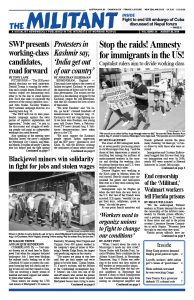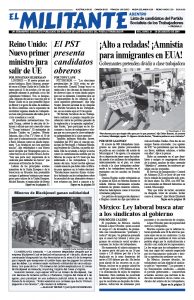Ending — for the moment — the immediate political crisis in Puerto Rico, Wanda Vázquez took the oath of office Aug. 7 as governor of the U.S. colony following weeks of protests that forced the resignation of Ricardo Rosselló.
But the underlying causes of the protests remain: the distrust toward all the capitalist parties there; the contempt towards working people by the capitalist politicians; the anti-worker measures imposed by the U.S. government and the local colonial regime; and the lack of sufficient government aid for rebuilding two years after Hurricane Maria devastated the island.
Hundreds of thousands had taken to the streets after online “chats” by Gov. Ricardo Rosselló and his closest aides were made public July 13. Rosselló and his aides revealed total contempt for working people, even joking about the corpses of hurricane victims.
For wide layers of the island’s population, Rosselló’s chats were the straw that broke the camel’s back in the face of a government that for an entire year insisted that only 64 people had died from the hurricane. Rosselló finally admitted that the death toll was closer to 3,000.
His arrogant disregard for working people comes on top of more than a decadelong bipartisan offensive against the wages and living conditions of working people in the U.S. colony.
More than 30,000 government workers have been laid off since 2006. Hundreds of schools closed. Sales taxes rose to 11.5%, higher than any of the 50 states. Pensions have been slashed. Decaying infrastructure even before Hurricane Maria ravaged Puerto Rico in 2017. Hundreds of thousands abandoned the island to move to the U.S., and even more in the aftermath of the storm.
Tania Hernández was one of those who left. “I couldn’t afford to move out from my mom’s house,” she told the Militant from California. “So I scraped up enough for a plane ticket and here I am.” She is working two jobs, to get by.
Feud over Rosselló successor
Rosselló announced his resignation effective Aug. 2 at 5 p.m. The colonial constitution says the next in line was the secretary of state. But he was also caught up in the chat scandal and had resigned. On Aug. 1 Rosselló named Pedro Pierluisi as secretary of state.
Pierluisi has been one of the lawyers aiding the Fiscal Oversight and Management Board, which was appointed by President Barack Obama, and has the power to compel the government to speed up its anti-worker measures.
Though a member of Rosselló’s party, Pierluisi is viewed by some workers as a less corrupt lesser evil.
The Senate put off voting on Pierluisi’s appointment to Aug. 5. That didn’t stop Pierluisi and Rosselló. They declared that Pierluisi was secretary of state and then had him sworn in as governor just after 5 p.m., Aug. 2.
The island’s Supreme Court disagreed and ruled that the appointment was unconstitutional Aug. 7. Vázquez, next in line as secretary of justice, was sworn in, becoming the island’s third governor in three days.
The fiscal board, meanwhile, is continuing to press for deeper measures aimed at making working people pay for the economic crisis and to maximize payment on the government’s $74 billion debt.
The board has reached an agreement on a “haircut” that would guarantee some bondholders 64 cents on the dollar. Still not bad for those investors who bought the bonds at as low as 15 cents on the dollar.
As the protests were winding down the board released its annual report, which states that “Puerto Rico must urgently adopt a series of bold actions to improve its fiscal and economic trajectory.” Everyone knows what that means: more pension cuts, more school closings, more layoffs.

